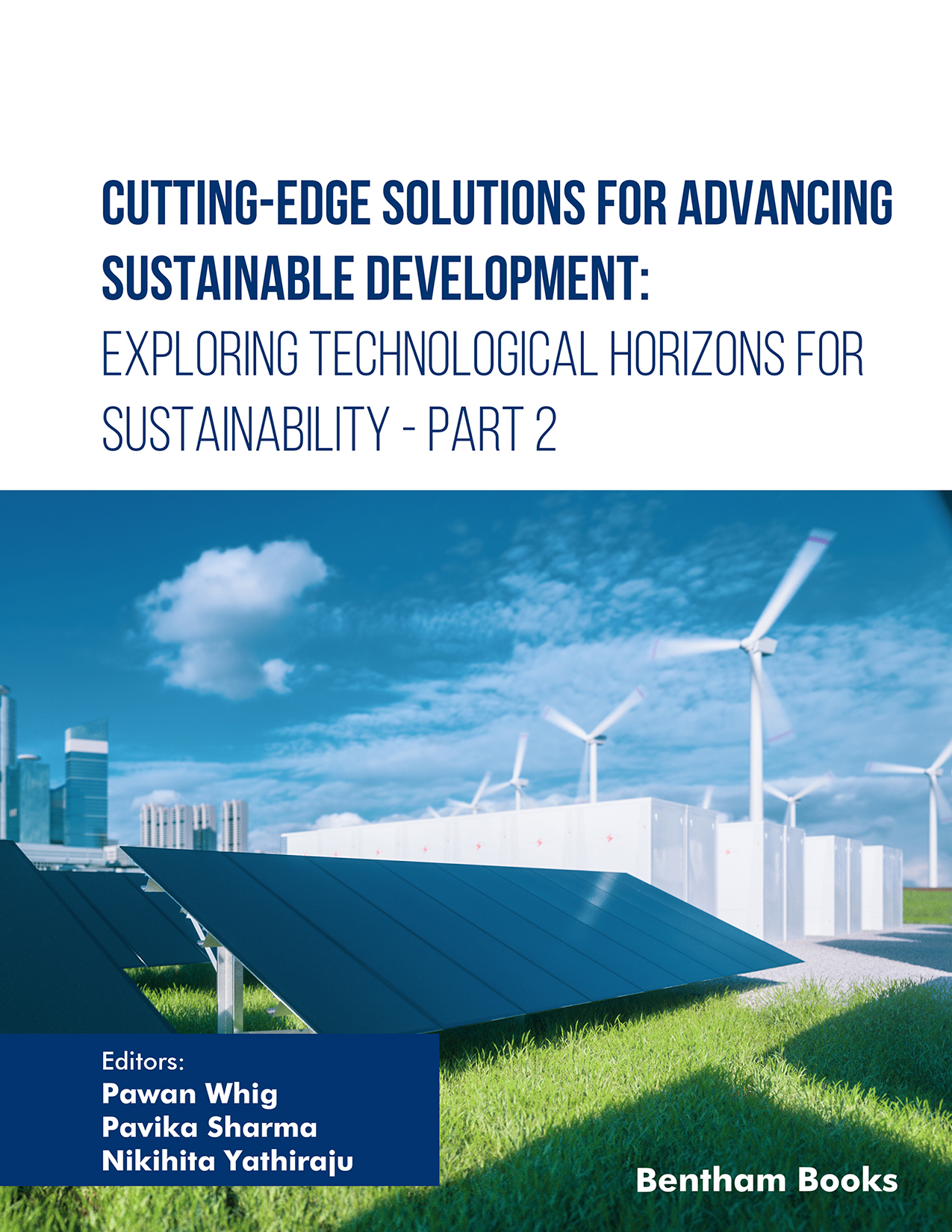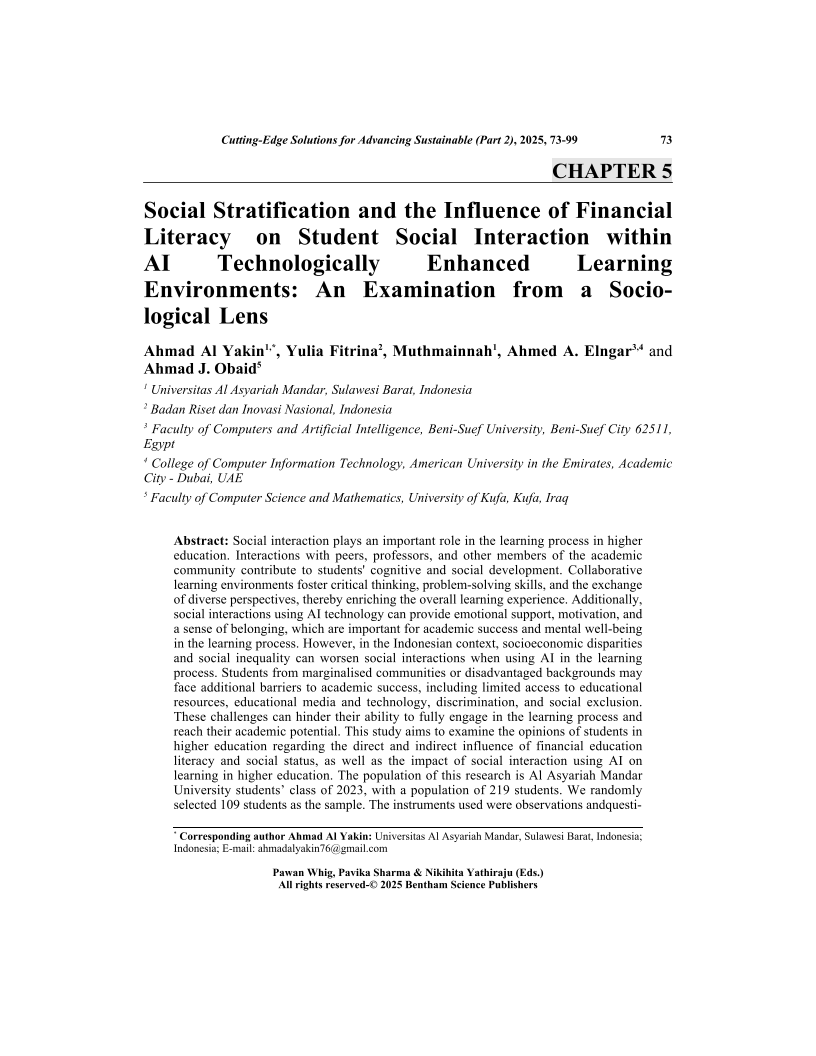Social Stratification and the Influence of Financial Literacy on Student Social Interaction within AI Technologically Enhanced Learning Environments: An Examination from a Sociological Lens

- Authors: Ahmad Al Yakin1, Yulia Fitrina2, Muthmainnah3, Ahmed A. Elngar4, Ahmad J. Obaid5
-
View Affiliations Hide Affiliations1 Universitas Al Asyariah Mandar, Sulawesi Barat, Indonesia 2 Badan Riset dan Inovasi Nasional, Indonesia 3 Universitas Al Asyariah Mandar, Sulawesi Barat, Indonesia 4 Faculty of Computers and Artificial Intelligence, Beni Suef University, Beni-Suef City 62511, Egypt 5 Faculty of Computer Science and Mathematics, University of Kufa, Kufa, Iraq
- Source: Cutting-Edge Solutions for Advancing Sustainable Development: Exploring Technological Horizons for Sustainability - Part 2 , pp 73-99
- Publication Date: April 2025
- Language: English
Social Stratification and the Influence of Financial Literacy on Student Social Interaction within AI Technologically Enhanced Learning Environments: An Examination from a Sociological Lens, Page 1 of 1
< Previous page | Next page > /docserver/preview/fulltext/9789815322408/chapter-5-1.gif
Social interaction plays an important role in the learning process in higher education. Interactions with peers, professors, and other members of the academic community contribute to students' cognitive and social development. Collaborative learning environments foster critical thinking, problem-solving skills, and the exchange of diverse perspectives, thereby enriching the overall learning experience. Additionally, social interactions using AI technology can provide emotional support, motivation, and a sense of belonging, which are important for academic success and mental well-being in the learning process. However, in the Indonesian context, socioeconomic disparities and social inequality can worsen social interactions when using AI in the learning process. Students from marginalised communities or disadvantaged backgrounds may face additional barriers to academic success, including limited access to educational resources, educational media and technology, discrimination, and social exclusion. These challenges can hinder their ability to fully engage in the learning process and reach their academic potential. This study aims to examine the opinions of students in higher education regarding the direct and indirect influence of financial education literacy and social status, as well as the impact of social interaction using AI on learning in higher education. The population of this research is Al Asyariah Mandar University students' class of 2023, with a population of 219 students. We randomly selected 109 students as the sample. The instruments used were observations andquestionnaires, which were processed using IBM 26-version statistics. The data results show that, from a sociological perspective, the influence of economic status and social interaction on the learning process in higher education in Indonesia is a complex problem with many aspects. Economic status often determines access to educational resources, such as the availability of smartphones and quotas to access AI applications for learning, as well as the choice of quality universities, tutoring, and educational materials. Survey results show that although students with higher economic backgrounds have access to better educational opportunities, in class they are required to share with classmates who do not have laptops or smartphones. Lecturers determine group division based on existing resources, including tutoring, private, and enrichment educational programmes within the AI learning environment for students who are falling behind, which can have a positive impact on their academic performance. Students from lower socioeconomic backgrounds, on the other hand, may face financial constraints that limit their access to educational resources, educational media, and technology, potentially hindering their academic success, but they are highly motivated to learn and actively engaged throughout the learning process through AI technology in university. This research contributes to addressing the impact of economic status and social interactions using AI on the learning process in higher education with a comprehensive approach that recognises and addresses underlying social inequalities, including the implementation of policies in higher education and programmes aimed at reducing socio-economic disparities, and providing fair access. to educational resources, fostering inclusive learning environments, and developing supportive social networks within educational institutions that create a more equitable and conducive learning environment for all students, regardless of economic background or social status.
-
From This Site
/content/books/9789815322408.chapter-5dcterms_subject,pub_keyword-contentType:Journal -contentType:Figure -contentType:Table -contentType:SupplementaryData105

